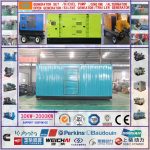Introduction
Organizing events, whether they are large-scale concerts, festivals, corporate gatherings, or outdoor exhibitions, requires meticulous planning and attention to detail. One critical aspect that event organizers must consider is the power supply needed to ensure a smooth and successful event. In scenarios where the venue does not have access to a reliable electricity grid, diesel generators play a crucial role in providing a dependable power source. This article explores the importance of diesel generators for event logging, highlighting their benefits, key features, maintenance requirements, and best practices for optimal performance.
Benefits of Diesel Generators for Event Logging
1. Reliability: One of the primary advantages of diesel generators for event logging is their reliability. Diesel generators are known for their robustness and ability to provide continuous power for extended periods. This reliability is essential for events where interruptions in power supply can lead to disruptions or even cancellations.
2. Portability: Many diesel generators designed for event logging are portable, making them easy to transport and set up at various event locations. This portability ensures flexibility in power supply arrangements, allowing event organizers to adapt to different venues and requirements.
3. Power Output: Diesel generators are capable of delivering high levels of power output, making them suitable for events with varying energy demands. Whether powering lighting systems, sound equipment, HVAC systems, or other electrical devices, diesel generators can meet the power requirements of most events.
4. Fuel Efficiency: Diesel generators are known for their fuel efficiency compared to other types of generators. This efficiency is a significant advantage for event organizers looking to minimize fuel costs while ensuring a stable power supply throughout the event duration.
5. Durability: Diesel generators are built to withstand rugged conditions and heavy usage, making them suitable for outdoor events or locations with challenging environments. Their durable construction ensures that they can operate reliably even in adverse weather conditions.
Key Features of Diesel Generators for Event Logging
1. Engine Capacity: The engine capacity of a diesel generator determines its power output capabilities. Event organizers should select a generator with an engine capacity that matches the energy requirements of the event to ensure uninterrupted power supply.
2. Fuel Tank Capacity: The fuel tank capacity of a diesel generator influences its runtime before requiring refueling. Generators with larger fuel tanks can operate for longer durations without interruptions, which is crucial for events that span several hours or days.
3. Noise Level: Some diesel generators are equipped with noise-reducing features to minimize sound emissions during operation. This is particularly important for events where noise pollution must be kept to a minimum to enhance the attendee experience.
4. Automatic Start/Stop Function: Diesel generators with automatic start/stop functions can activate and deactivate based on power demand, improving fuel efficiency and reducing manual intervention. This feature is convenient for event organizers as it ensures seamless power supply management.
5. Monitoring and Control Systems: Advanced diesel generators come equipped with monitoring and control systems that allow event organizers to track performance metrics, diagnose issues, and optimize operation remotely. These systems enhance operational efficiency and ensure timely maintenance.
Maintenance Requirements for Diesel Generators
Proper maintenance is essential to ensure the reliable performance of diesel generators for event logging. Event organizers should adhere to the following maintenance requirements to maximize the lifespan and efficiency of their generators:
1. Regular Inspections: Conduct routine visual inspections of the generator components, including the engine, fuel system, cooling system, and electrical connections. Look for signs of wear, leaks, or damage that may indicate potential issues.
2. Scheduled Servicing: Follow the manufacturer's recommended service schedule for routine maintenance tasks such as oil changes, filter replacements, and coolant checks. Regular servicing helps prevent breakdowns and ensures optimal generator performance.
3. Fuel Quality: Use high-quality diesel fuel to prevent contamination and ensure smooth operation of the generator. Contaminated fuel can damage the engine and lead to performance issues, so it is essential to monitor fuel quality closely.
4. Battery Maintenance: Check the battery condition regularly, including the terminals, cables, and electrolyte levels. Clean https://www.lkpowerplant.com/product/300kw-375kva-portable-engine-brand-new-diesel-generator-set/ on the battery terminals and ensure that the battery is adequately charged to support generator start-up.
5. Load Testing: Periodically conduct load tests on the generator to assess its ability to handle the event's power requirements. Load testing helps identify potential issues with the generator's performance under varying loads and enables proactive maintenance.
Best Practices for Optimal Performance
To ensure the optimal performance of diesel generators for event logging, event organizers should follow these best practices:
1. Conduct Site Surveys: Before the event, perform a site survey to assess the power requirements, available space for generator placement, and fuel storage options. This information will help determine the appropriate generator size and configuration for the event.

2. Backup Power Planning: Consider implementing a backup power plan that includes redundant generators or alternative power sources in case of generator failure. Having contingency measures in place can prevent disruptions and ensure uninterrupted power supply during the event.
3. Fuel Management: Maintain adequate fuel reserves on-site to sustain the generator throughout the event duration. Monitor fuel levels regularly and plan for refueling intervals to prevent unexpected power outages.
4. Emergency Response Preparedness: Develop an emergency response plan that includes procedures for addressing generator malfunctions, power failures, and other contingencies. Ensure that event staff are trained to handle power-related issues effectively.
5. Post-Event Inspection: After the event, conduct a thorough inspection of the generator to identify any wear and tear, damage, or maintenance requirements. Address any issues promptly to prepare the generator for future events.
Conclusion
Diesel generators play a vital role in ensuring reliable power supply for events of all sizes and types. Event organizers can leverage the benefits of diesel generators for event logging by selecting appropriate models, implementing regular maintenance practices, and following best practices for optimal performance. By prioritizing power reliability through diesel generators, event organizers can enhance the attendee experience, minimize disruptions, and create successful events that leave a lasting impression.
